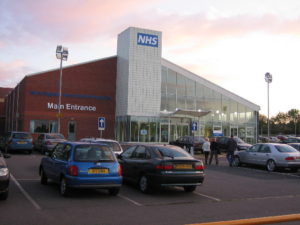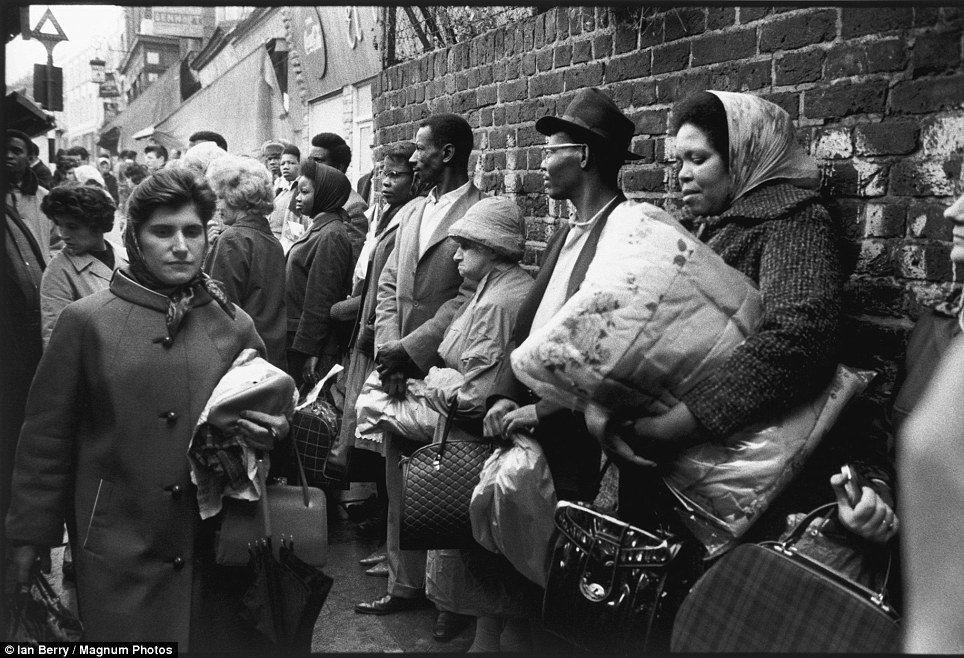19 April 2018
Hospital Parking and Windrush
Exercise of Judgement.
by Lynda Goetz
 Several newspapers of different political persuasions carried the story last week of ‘Good Samaritan’ Kevin Williams who, whilst helping a woman he didn’t know, overstayed his allowed 20-minutes in an NHS hospital car park by just one second, for which he received a £70 fine. In spite of an appeal to POPLA (Parking on Private Land Appeals), the fine was upheld and was reluctantly paid by Mr Williams to avoid any further ‘hassle’ (my word not his).
Several newspapers of different political persuasions carried the story last week of ‘Good Samaritan’ Kevin Williams who, whilst helping a woman he didn’t know, overstayed his allowed 20-minutes in an NHS hospital car park by just one second, for which he received a £70 fine. In spite of an appeal to POPLA (Parking on Private Land Appeals), the fine was upheld and was reluctantly paid by Mr Williams to avoid any further ‘hassle’ (my word not his).
This story raises three separate issues: firstly, there is the one of NHS car parking charges; secondly there is the question of the activities of ParkingEye, other private parking and appeal bodies; and thirdly, there is the wider problem of an increasing lack of the use of human judgement in almost every aspect of contemporary life. This is evidenced not only by poor Mr Williams’s frustrating predicament, but by the far worse predicaments of the so-called Windrush immigrants, widely covered and condemned across all media.
As far as the first is concerned, those interested may care to know that there is currently a Private Members Bill for the Abolition of Hospital Parking Charges, which is due for its second reading in the Commons on 11th May. This was put forward by Conservative MP Robert Haflon and had its first reading on 14th November last year. It has cross-party support and in opposing it, fellow Conservative James Duddridge agreed that it would be a popular move, ‘popular with my constituents’, but one that is ‘flawed’ and ‘needs to be opposed’.
Anyone who has ever had to visit a hospital as a visitor or a patient (which, let’s face it, is probably most of us at one time or another) knows how deeply frustrating car parking can be. Most hospitals never seem to have enough spaces and it is not cheap. As Robert Haflon stated in moving the bill, ‘no-one goes to hospital out of choice’ and, self-evidently, ‘the sick and vulnerable are disproportionately hit’. In Scotland and Wales hospital car parking is generally free of charge*, but according to the British Parking Association this has not solved but rather exacerbated the main hospital parking problem – lack of spaces. The NHS is already short of money and as it appears to be the sacred cow of British politics it seems unlikely that a major overhaul of the way it is funded is going to happen any time soon. If car parking charges were to be completely abolished, the funding stream this provides (even if it is for items such as maintenance and exterior lighting etc. rather than directly towards patient care) is going to need to be replaced. From where?
 Lack of spaces was the main argument used by ParkingEye when defending their seemingly draconian enforcement of the parking time allowance. A spokeswoman for the company said: “Our clients’ parking, in areas such as hospitals, needs to be monitored to ensure that patients can effectively access services”. However, such reasoning could hardly apply in the case of Nicholas Bowen QC, who in August last year successfully took on ParkingEye over an £85 fine incurred for overstaying the allowed 2 hours in an ‘almost empty’ service station car park at night. The case was reported in The Guardian by Rebecca Smithers (QC takes on ParkingEye). Although Mr Bowen’s victory for common sense (“There should not be a disincentive to stop at night. As the signs say: ‘Tiredness kills –take a break’”) appears to have been at least in part the result of some technical failure to comply by ParkingEye, it is good that someone with his knowledge and abilities was able to challenge their contractual terms and ‘unlawful and unconscionable practice’. I have direct knowledge of a case where someone had purchased a parking ticket for a beach parking area but received a fine because ‘the ticket was not correctly displayed’. In fact the wind had turned the ticket over as the owner left the car. Subsequent production of the properly purchased ticket failed to move the private car parking organisation in question or the independent appeals service, which confirmed that the owner had ‘failed to display the ticket in accordance with contractual terms’. Two helpful sources of information regarding ‘Parking Charge Notices’ (as opposed to Local Authority ‘Penalty Charge Notices ‘) are Citizens Advice and a Telegraph Money Article from last November, although there are of course plenty of others to be found online. Another Private Members Bill, The Parking (Code of Practice Bill) received its second reading on 2nd February this year. It is intended to crack down on the worst practices of private parking companies.
Lack of spaces was the main argument used by ParkingEye when defending their seemingly draconian enforcement of the parking time allowance. A spokeswoman for the company said: “Our clients’ parking, in areas such as hospitals, needs to be monitored to ensure that patients can effectively access services”. However, such reasoning could hardly apply in the case of Nicholas Bowen QC, who in August last year successfully took on ParkingEye over an £85 fine incurred for overstaying the allowed 2 hours in an ‘almost empty’ service station car park at night. The case was reported in The Guardian by Rebecca Smithers (QC takes on ParkingEye). Although Mr Bowen’s victory for common sense (“There should not be a disincentive to stop at night. As the signs say: ‘Tiredness kills –take a break’”) appears to have been at least in part the result of some technical failure to comply by ParkingEye, it is good that someone with his knowledge and abilities was able to challenge their contractual terms and ‘unlawful and unconscionable practice’. I have direct knowledge of a case where someone had purchased a parking ticket for a beach parking area but received a fine because ‘the ticket was not correctly displayed’. In fact the wind had turned the ticket over as the owner left the car. Subsequent production of the properly purchased ticket failed to move the private car parking organisation in question or the independent appeals service, which confirmed that the owner had ‘failed to display the ticket in accordance with contractual terms’. Two helpful sources of information regarding ‘Parking Charge Notices’ (as opposed to Local Authority ‘Penalty Charge Notices ‘) are Citizens Advice and a Telegraph Money Article from last November, although there are of course plenty of others to be found online. Another Private Members Bill, The Parking (Code of Practice Bill) received its second reading on 2nd February this year. It is intended to crack down on the worst practices of private parking companies.
 We come finally to the Windrush immigrants and the exercise of judgement, or lack therof. Brendan O’Neill in the Spectator describes the situation beautifully, “To see the cruelty of bureaucracy, the injustice that can spring from reducing public life to mere process and human beings to paperwork, look no further than the Windrush scandal”. He says later in his excellent piece, “This scandal gives us a terrifying glimpse into the moral lethargy that can descend when officialdom becomes all about ticking boxes and checking papers rather than thinking and understanding”. Of course people across the political spectrum are outraged that this sort of heartless treatment of individuals can occur in their name, in their country. In Amber Rudd’s apology three days ago she said that officialdom sometimes ‘loses sight of individuals’. Well it shouldn’t. Officialdom is (for now at least) made up of individuals. Of course they should be aware of those with whom they are dealing, those individuals who collectively make up society. Robotics and AI are only likely to accelerate this disastrous tendency to ignore individuals and to substitute emotional intelligence and judgement with cameras, computers and form filling. Mark Carney, Governor of the Bank of England, said in a speech this week that the rise of big data, high-tech machines and artificial intelligence could render many jobs redundant in a revolution reminiscent of the Industrial Revolution. If that is indeed the way we are going, we definitely need those individuals left in charge of the machines and the systems to exercise judgement and emotional intelligence, whether it be on the subject of car parking fines or the citizenship of people who have been here for half a century or more.
We come finally to the Windrush immigrants and the exercise of judgement, or lack therof. Brendan O’Neill in the Spectator describes the situation beautifully, “To see the cruelty of bureaucracy, the injustice that can spring from reducing public life to mere process and human beings to paperwork, look no further than the Windrush scandal”. He says later in his excellent piece, “This scandal gives us a terrifying glimpse into the moral lethargy that can descend when officialdom becomes all about ticking boxes and checking papers rather than thinking and understanding”. Of course people across the political spectrum are outraged that this sort of heartless treatment of individuals can occur in their name, in their country. In Amber Rudd’s apology three days ago she said that officialdom sometimes ‘loses sight of individuals’. Well it shouldn’t. Officialdom is (for now at least) made up of individuals. Of course they should be aware of those with whom they are dealing, those individuals who collectively make up society. Robotics and AI are only likely to accelerate this disastrous tendency to ignore individuals and to substitute emotional intelligence and judgement with cameras, computers and form filling. Mark Carney, Governor of the Bank of England, said in a speech this week that the rise of big data, high-tech machines and artificial intelligence could render many jobs redundant in a revolution reminiscent of the Industrial Revolution. If that is indeed the way we are going, we definitely need those individuals left in charge of the machines and the systems to exercise judgement and emotional intelligence, whether it be on the subject of car parking fines or the citizenship of people who have been here for half a century or more.
*apart of course for the University Hospital of Wales in Cardiff, with car park managed by private operator Indigo, which last year won a court case against staff who had racked up tens of thousands of pounds in fines (NHS staff to pay thousands in car park fines)


